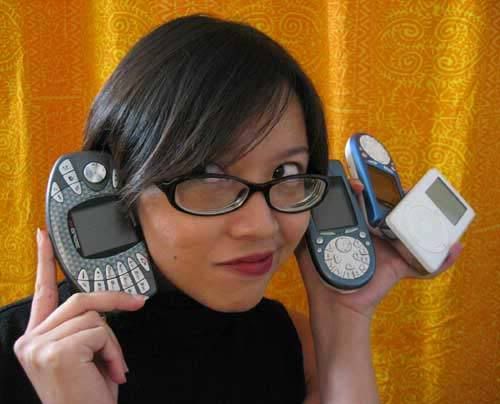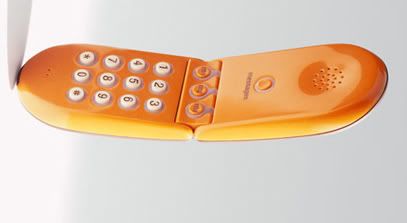Don't you think it would be more relevant to society to produce efficient, honest, relevant designs rather than self- indulgent, self- promotional work that aims to provide some form of social commentary schtick?
I apologise, because I don't really have time to engage with this issue in the detail I'd like to. Before I share my thoughts on this I better clarify two points;
I'm looking at design, as someone from a product, industrial design background. My education was in this particular discipline, and many of the frustrations touched upon in my last post are directed towards it.
Secondly when I talk about the need for Social Critique or Commentary in design, I'm primarily interested in this being used to address the unquestioned adoption of new technology, and our values in a consumer culture.
I suppose I should ask you a bit more about what you would term 'honesty' in this context?
Good / Ethical design is supposed to do exactly what you stated,
"to produce efficient, honest, relevant designs"

IDEO helped to develop this human-powered water pump that allows African farmers to continue to grow vegetables into the dry season, and sell the excess to pay for food, water, medicine, and school fees for their family.
Here's efficient, honest, relevant design at its best, a Human-powered irrigation pump (designed in collaboration with IDEO for a non profit organisation in Kenya). The problem it solves is a simple one. Engineering skills are applied. Its parts can be assembled without tools. Its cheap, a simple logistical problem is solved. All very positive. Deciding what efficiency, honesty and relevance are pretty straightforward in this context. Design in this example is not at all self-expressive, its pure process, the simple journey from A to B, from problem to objective solution.
The problem is designers are not commonly asked to address such simple, logistical problems anymore. And when we talk about designing for a surplus, consumer culture, the boundaries become comparatively blurred. The designer may serve his marketing and technologist seniors at Samsung/Motorola/Nokia with an exemplary level efficiency, honesty, skill, and end up only in speeding the delivery of a new mobile phone, which ticks a greater number of boxes in feature review list. Technology is THE driver for development. And the person who ends up owning, using this design (crudely termed as the User or Consumer by the industry itself) is perhaps looking for something more than just use or efficiency. In this context design becomes more of a discipline, which attempts to sell fulfilling experiences, than simple functioning solutions.

(left of the picture) Nokia's N-Gage, a mobile phone and high resolution gaming console in one. The bizarre compromise for the user, is that you have to use the thin edge of the phone to make telephone calls.
The particular problem with electronic consumer products is that however limiting, badly conceived, superficial. When these new products reach the shop floor they have a shinny, official status which people don't seemingly have any opportunity to engage with or question the worth of.
And as degree courses become more vocational, the same model filters down into design education. Those slick models you see at Transport and Industrial design degree shows, are a marketed solution, not ideas to be debated and engaged with. They replicate the same model of official corporate design to infinity. The paradoxical thing about technology is that it’s perceived as a very rational scientific force, and yet it’s applied in the most irrational way, commonly driven only by what’s new and what’s possible.
All in all this is a rather confusing context for designers who simply want to design 'better products'. What is a better product?? One, which is honest and efficient, or one, which enhances experience?

Seymour|Powell's 'ello' mobile phone
What could we call "efficient, honest, relevant" in the context of a technology product like a mobile phone? You might cite an example like Seymour|Powell's 'ello mobile'. The goals of the project where to design a handset which enabled inclusive use for all, young and old. Beyond achieving simple usability I actually find its 'less is more philosophy' quite refreshing.
But what the ello phone doesn't do is to explore the way mobile phones are used in a wider social context, or explore the possibilities for developing richer interactions. This is where Exploratory Interaction Design and Critical Design come into play.
Firstly they foster a culture of critique within the design and technology sphere, provoking debate on the role technology plays in our life, rather than painting a false utopian picture of an imaginary product enhanced existence. Secondly they suggest ideas, which in a mainstream industrial design context maybe considered too silly, poetic, playful to have any genuine credibility. In effect they are more closely informed by human behaviour, than the availability of the latest technologies.
To give this post a little more context I'm going to mention two projects I find particularly poignant. Firstly Carlos Jaramillo’s Hudie . Secondly Synnøve Fredericks Doffing Headphone.

(left) Synnøve Fredericks Doffing Headphone,
(right) Carlos Jaramillo's Hudie
These two projects are very different, but they act to critique a similar theme. You might call both objects ‘Social Props’, their not pieces of technology in themselves, but they explore the way we do interact with technology, particularly within public the spaces we share with others, where emerging mobile technologies encourage us to isolate ourselves.
The Doffing Headphone, is a pair of earphones designed for a social context. It offers a very positive, poetic new gesture of technological etiquette, just like the 'doffing' your cap to someone.
Hudie provides a splendidly isolated environment for the mobile games player, and a rather sinister sceptical for everyone else. This sting in the tail is intentional. But step into any tube carriage and you'll see that the situation it critiques has emerged unchecked, people gaze hypnotically at the screens of their Playstation Portables, business men are hunched in the Blackberry Prayer Position. Critical design in this context stops and asks us if were sure, if these are the kind of behaviours we want to be designing? I imagine the designers of Blackberry and the PSP painted a fairly rosy, utopian picture of their use, and that the development process for each was a model of honesty and efficiency.
Are these pieces of work self-promotional? - YES! Surely the natural aim of any designer is self-promotion. But I find it hard to label critical/speculative work as indulgent or self-serving when it aims to critique such widely held concerns about our relationship with technology. If we simply strive hard to design better products, we get stuck in the same old paradigm’s that have already been established. Mobile phones of the future are supposed to be faster, smaller, packed with new features, the possibilities for fostering meaningful interaction get shut down.
I don't think that the existence of this speculative work detracts in any way from the objective, problem-solving design it co-exists with. But what it does do is to cut a little deeper into the consciousness of the design community and the public.
No comments:
Post a Comment